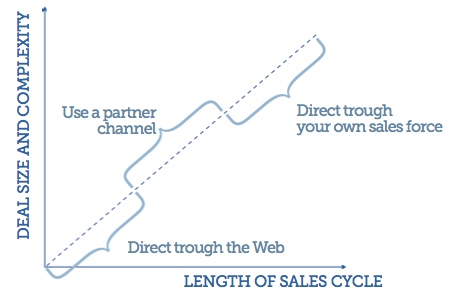To Partner or Not to Partner in the Software Industry
Using a channel of independent companies to resell, implement and/or service customers has a long tradition in the history of the software industry.
For some software companies the channel has been a major contributor to global success, but for most software companies making it work is a depressing and constant struggle.
The word “channel” is used in the software industry to describe independent companies that assume various roles and obligations in bringing a software product to the customers. The definition is rather broad, since the roles and obligations can vary substantially from “simple” reselling to system integration, solution development on top of the software, implementation in terms of consulting, project management, customization, training and support.
The common denominator is the fundamental condition that the individual channel Partner is an independent contractor operating in his own name, at his own expense and at his own risk.
The key parameters for going with channel partners.
So when do we choose a partner channel based GTM (go-to-market) approach and when do we select a direct model?
The following issues have a substantial impact on the choice of a GTM approach;
- Do you have a proven repeatable and scalable business model?
- Is your product designed for the channel?
- Which parts of the value chain will you allocate to your channel partner?
- How large is the market (in terms of business opportunities)?
- What is the typical value add for the partner (in pct. of total solution price and in money value)?
- What is the length of the sales cycle?
- What is the average deal size?
- How much is cost of sales in pct. of deal revenue?
- How long is the learning curve from kick off to full qualification of the minimum partner team?
- How competitive is your market?
Proven Business Model
Companies looking for a business model (start-ups) should not spend much time on the channel. Even if the channel is a an integrated part of the business model idea, the focus should be on finding the product/service that customers are prepared to queue up to buy. Until that business model has been found and tested there is little you can achieve by spending time with potential partners.
If you are a start-up: Stop reading and go to Steve Blanks blog. It contains tons of material that is relevant for your situation.
Designed for the channel
Most successful channel eco-systems had the channel in mind when designing the product and the business model. The channel is not only selling the product/service. The channel is also making critical contributions such as:
- Vertical and horizontal product enhancements
- Customizations
- Customer training
- Project management
- 1st line support
- Lead generation
- Sales
These observations may seem contradictory to our statements about the proven business model above, but they are not. The channel may be an integrated part of your business model idea, but you must first validate that there is sufficient customer demand for your solution. Only customers can make that validation; Channel Partners cannot.
The Value Chain
A software business value chain typically has two major parts:
- Marketing and sales
- Implementation and customer management
Marketing and sales
| Your Focus | Your Partner’s Focus |
|---|---|
| Most software companies are looking to the channel to also assume responsibility for building awareness, generate leads and close sales. | Most channel partners are looking for customers/projects where they can sell more of the services they already have on the shelves. |
This dichotomy in the perception of roles often leads to massive conflicts and frustration. The software company expects the partners to generate business and the partners expect the software vendor to build awareness and generate leads. Both sides are waiting for the other to move first.
Implementation and customer management
In many areas successful implementation and subsequent customer management is just as important as closing sales. A customer is not a reference until he is happy with the solution. If you manage to sell, but fail to implement, then you have moved two steps forward and three steps back. If you have implemented poorly and don’t get any add-on business, then you may never achieve a positive gross margin on the deal.
Your recruitment strategy and your business partner programs must address each and every step in the total value chain for which you expect your partner to assume responsibility.
 Mass or niche market
Mass or niche market
A channel is most appropriate for very large markets. Small niche markets are difficult to dominate through a partner channel.
Value Add and Deal Size
A channel is most appropriate for mid-sized deals.
Small-sized deals and short sales cycles are potential candidates for a direct web based approach. Partners may come into the picture later on, but typically on their own initiative.
Large-sized deals and long sales cycles are poison for the channel. These types of deals require substantial domain and product knowledge, which takes years to acquire. Partners may come into the picture later on, but typically for selected implementation tasks late in the value chain.
The mid portion of the curve with medium-sized deals and medium-sized sales cycles can be suitable for a channel partner approach.
Competition
A market with no competition is not a market. Using a partner channel is not a good option for building a market. Market building is the job of the software vendor (brand owner).
Breaking into a hyper-competitive market through a channel is also very difficult. The channel partners already have competitive solutions in their portfolio. Making them change requires dealing with the cost of migration, which most often makes a shift too risky for the partner
The best time for using a channel is when a market is established, but not yet hyper-competitive. Identifying this timing is obviously not easy. There are no general guidelines for assessing when the timing is right. We recommend testing the waters and conducting experiments. Don’t invest the whole company in a single strategy, but test and adjust as you learn what works and what does not.
A channel assessment test is available here if you would like to see where your company stands. Click here for the Assessment Test.









